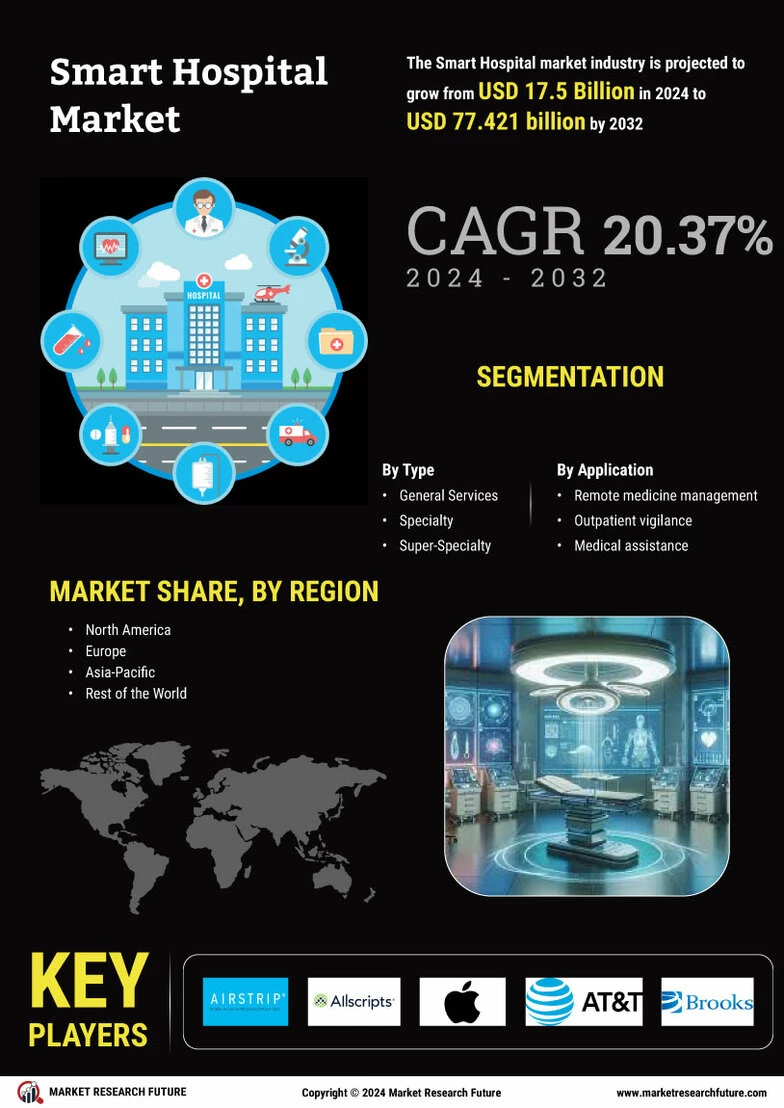Smart Hospital Market Growth: Drivers and Emerging Trends
The Smart Hospital market growth is propelled by technological advancements and the increasing need for efficient healthcare delivery. Integration of AI, IoT, and big data analytics in hospital management allows providers to optimize patient care, reduce costs, and enhance decision-making processes. Hospitals are moving towards fully connected environments with smart patient beds, automated drug dispensing systems, and wearable monitoring devices, which collectively improve clinical outcomes. Market growth is also driven by a focus on patient satisfaction, reducing hospital-acquired infections, and enhancing staff productivity through technology adoption.
Get Full Reports:https://www.marketresearchfuture.com/reports/smart-hospital-market-4505
Telemedicine, remote patient monitoring, and AI-powered imaging solutions are among the emerging trends contributing to market growth. Hospitals are adopting cloud-based platforms and electronic health records to facilitate data sharing and real-time communication among healthcare professionals. Moreover, the growing demand for home healthcare services and the rise of chronic diseases are increasing the need for continuous monitoring and predictive care. These factors collectively fuel Smart Hospital market growth, creating opportunities for technology providers, healthcare organizations, and investors seeking to leverage digital healthcare solutions.
FAQs:
Q1: What factors contribute to the growth of smart hospitals?
A1: Technological adoption, patient-centric care, digital health solutions, and demand for operational efficiency drive market growth.
Q2: What are the emerging trends in the Smart Hospital Market?
A2: AI-powered diagnostics, remote monitoring, telemedicine, and IoT-enabled devices are key emerging trends.
Q3: How does technology improve patient care in smart hospitals?
A3: By enabling real-time monitoring, predictive analytics, automated workflows, and seamless communication across departments.
The Smart Hospital market growth is propelled by technological advancements and the increasing need for efficient healthcare delivery. Integration of AI, IoT, and big data analytics in hospital management allows providers to optimize patient care, reduce costs, and enhance decision-making processes. Hospitals are moving towards fully connected environments with smart patient beds, automated drug dispensing systems, and wearable monitoring devices, which collectively improve clinical outcomes. Market growth is also driven by a focus on patient satisfaction, reducing hospital-acquired infections, and enhancing staff productivity through technology adoption.
Get Full Reports:https://www.marketresearchfuture.com/reports/smart-hospital-market-4505
Telemedicine, remote patient monitoring, and AI-powered imaging solutions are among the emerging trends contributing to market growth. Hospitals are adopting cloud-based platforms and electronic health records to facilitate data sharing and real-time communication among healthcare professionals. Moreover, the growing demand for home healthcare services and the rise of chronic diseases are increasing the need for continuous monitoring and predictive care. These factors collectively fuel Smart Hospital market growth, creating opportunities for technology providers, healthcare organizations, and investors seeking to leverage digital healthcare solutions.
FAQs:
Q1: What factors contribute to the growth of smart hospitals?
A1: Technological adoption, patient-centric care, digital health solutions, and demand for operational efficiency drive market growth.
Q2: What are the emerging trends in the Smart Hospital Market?
A2: AI-powered diagnostics, remote monitoring, telemedicine, and IoT-enabled devices are key emerging trends.
Q3: How does technology improve patient care in smart hospitals?
A3: By enabling real-time monitoring, predictive analytics, automated workflows, and seamless communication across departments.
Smart Hospital Market Growth: Drivers and Emerging Trends
The Smart Hospital market growth is propelled by technological advancements and the increasing need for efficient healthcare delivery. Integration of AI, IoT, and big data analytics in hospital management allows providers to optimize patient care, reduce costs, and enhance decision-making processes. Hospitals are moving towards fully connected environments with smart patient beds, automated drug dispensing systems, and wearable monitoring devices, which collectively improve clinical outcomes. Market growth is also driven by a focus on patient satisfaction, reducing hospital-acquired infections, and enhancing staff productivity through technology adoption.
Get Full Reports:https://www.marketresearchfuture.com/reports/smart-hospital-market-4505
Telemedicine, remote patient monitoring, and AI-powered imaging solutions are among the emerging trends contributing to market growth. Hospitals are adopting cloud-based platforms and electronic health records to facilitate data sharing and real-time communication among healthcare professionals. Moreover, the growing demand for home healthcare services and the rise of chronic diseases are increasing the need for continuous monitoring and predictive care. These factors collectively fuel Smart Hospital market growth, creating opportunities for technology providers, healthcare organizations, and investors seeking to leverage digital healthcare solutions.
FAQs:
Q1: What factors contribute to the growth of smart hospitals?
A1: Technological adoption, patient-centric care, digital health solutions, and demand for operational efficiency drive market growth.
Q2: What are the emerging trends in the Smart Hospital Market?
A2: AI-powered diagnostics, remote monitoring, telemedicine, and IoT-enabled devices are key emerging trends.
Q3: How does technology improve patient care in smart hospitals?
A3: By enabling real-time monitoring, predictive analytics, automated workflows, and seamless communication across departments.
0 Comentários
0 Compartilhamentos
613 Visualizações
0 Anterior

